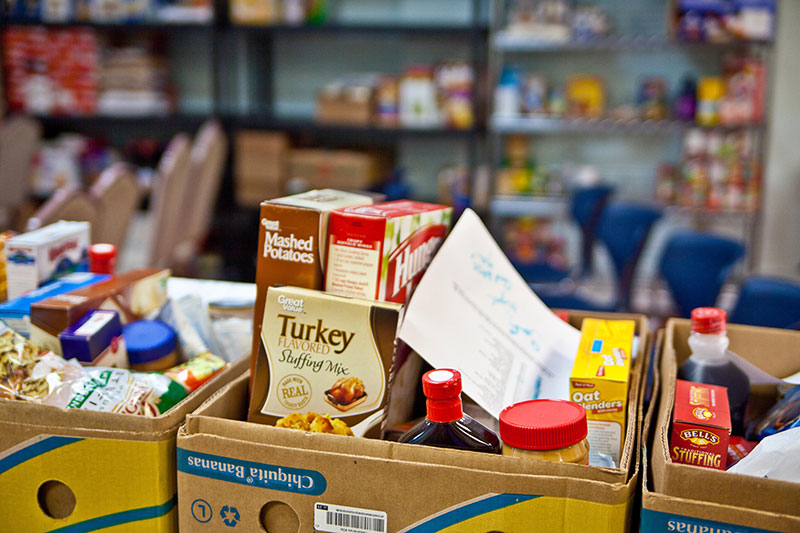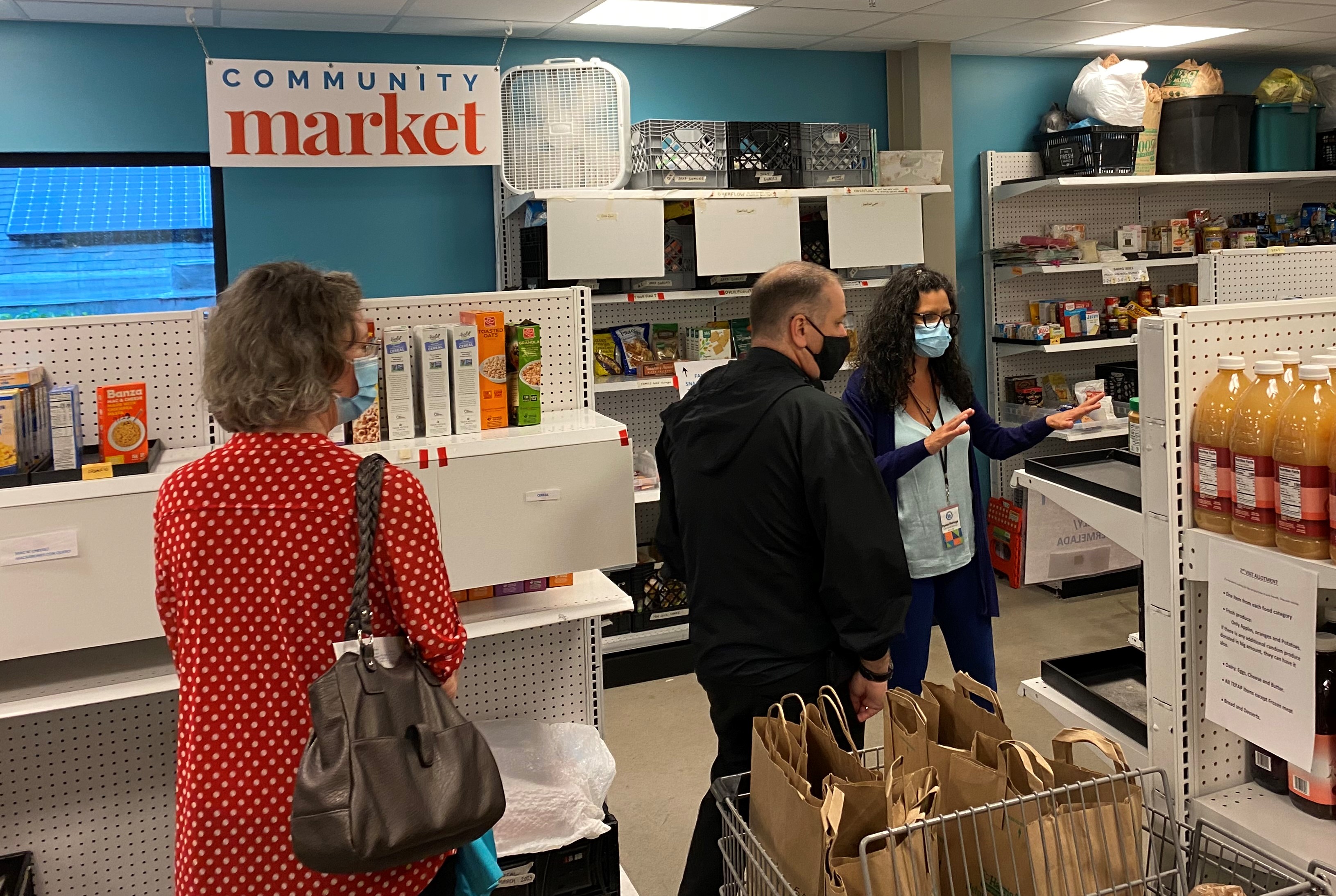How Food Pantries Provide Vital Resources for Family Members in Situation
Food kitchens offer as an essential lifeline for households experiencing crisis by offering not only food yet likewise a range of necessary resources made to support their instant and long-lasting demands. Understanding the complex duty of food pantries elevates crucial inquiries about their effect and the wider community dynamics at play.
Comprehending Food Insecurity
Food instability, a pushing problem affecting countless family members, refers to the lack of constant access to adequate food for an active, healthy life. This condition can come from numerous aspects, consisting of financial instability, joblessness, and rising living costs, which limit people' capacity to acquire or obtain nutritious food. Family members encountering food instability often depend on insufficient food resources, leading to bad dietary options and unfavorable wellness end results.
The implications of food instability prolong past instant appetite. It can negatively affect children's growth and advancement, contributing to behavioral and cognitive concerns. Moreover, adults experiencing food insecurity might deal with chronic health issue, such as obesity, diabetes, and heart diseases, as they turn to cheaper, much less healthy food choices.

Providers Provided by Food Pantries
Dealing with food insecurity requires a complex method, and food pantries play an essential duty in giving instant relief to family members in dilemma. These important services offer a range of sources focused on minimizing hunger and sustaining overall well-being.
Mostly, food pantries disperse nutritious food things, consisting of fresh produce, canned items, and non-perishable things. Numerous pantries prioritize healthy alternatives, comprehending the significance of appropriate nutrition in keeping physical and mental wellness. Furthermore, some food kitchens provide customized programs accommodating certain populaces, such as households with young kids or seniors, making sure that the unique dietary requirements of these teams are met.
Along with food distribution, numerous kitchens give supplemental services, such as accessibility to nourishment education workshops, cooking courses, and recipe-sharing campaigns. These programs equip family members to make informed options and use pantry resources properly. Some food pantries collaborate with local organizations to use aid in locations like economic proficiency, work training, and real estate assistance, attending to the more comprehensive challenges that contribute to food instability.
Via these detailed services, food kitchens not just minimize cravings however likewise foster durability and self-sufficiency in households facing difficult circumstances.
The Importance of Area Assistance
Neighborhood support is essential in combating food insecurity, as it fosters a network of resources and assistance that expands past the instant offerings of food pantries. This joint structure includes local companies, organizations, and volunteers that contribute time, funds, and items to improve food pantry procedures and outreach efforts.
When areas collaborated, they develop a durable safeguard for family members in crisis. Assistance from local businesses can bring about donations of surplus food and financial contributions, which aid preserve cupboard stocks and expand services. In addition, partnerships with colleges and health and wellness organizations can promote education and learning around nutrition and health, empowering family members to make informed selections.
Additionally, community participation encourages a feeling of belonging and reduces the preconception commonly associated with looking for assistance. They are much more most likely to gain access to food cupboard resources without worry or shame when individuals really feel supported by their neighbors. This common approach not only addresses immediate demands but also assists construct resilience within households, fostering long-term stability. Eventually, the relevance of community support can not be overemphasized; it is the foundation that strengthens the work of food kitchens and improves their influence on those facing food insecurity.
How to Access Food Pantry Resources
Accessing food pantry resources can considerably ease the burdens encountered by family members in dilemma. To start, people looking for support should recognize neighborhood food kitchens, which are often noted on social work web sites or can be situated with a basic net search (Food Pantry Lockhart). Several kitchens are associated with larger companies, such as the United Method or Feeding America, which can give additional guidance
:strip_icc()/Food-storage-containers-Joyelle_171012_013-1-6C4jblSM4qy9l-4M2BZPx--320301047ce840eb9434a51fc0f9860a.jpg)

In addition, lots of food kitchens use services past food circulation, such as dietary education and learning and references to other social services. Families ought to make inquiries regarding these additional sources when going to a cupboard.
Impact on Family Members Health
The schedule of food cupboard resources plays a critical function in boosting the overall well-being of families in situation. Access to nutritious food reduces instant hunger, which is fundamental for physical wellness. When households obtain ample food support, they experience a reduction in tension pertaining to food instability, allowing them to concentrate click now on other critical elements of their lives, such as work and education and learning.

The effect of food kitchens expands past the private to the family members unit. By making certain that standard nutritional demands are satisfied, households can engage more completely in their day-to-days live, assisting in better scholastic efficiency for children and improved work stability for adults (Food Pantry Lockhart). Inevitably, food cupboards work as important lifelines, significantly contributing to the general well-being and strength of families encountering crisis
Verdict
Food kitchens function as crucial lifelines for families experiencing crises by dealing with instant food instability and advertising lasting security. Through the arrangement of healthy food, curricula, and recommendations to extra solutions, these cupboards add significantly to the overall wellness of family members and individuals. Community assistance remains important for the sustainability and explanation efficiency of these resources. Eventually, food kitchens play an essential duty in cultivating resilience and improving the top quality of life for those in need.
Food kitchens offer as an important lifeline for families experiencing situation by providing not only food but also a variety of necessary resources designed to sustain their long-term and immediate demands.Mostly, food cupboards distribute healthy food items, consisting of fresh produce, tinned products, and non-perishable things. Some food pantries team up with regional organizations to supply help in areas like financial proficiency, job training, and housing assistance, attending to the more comprehensive challenges that contribute to food insecurity.
Inevitably, the significance of neighborhood support can not be overstated; it is the backbone that strengthens the work of food kitchens and enhances their effect on those facing food instability.
Food pantries offer as crucial lifelines for households experiencing situations by attending to immediate food insecurity and advertising long-lasting security.